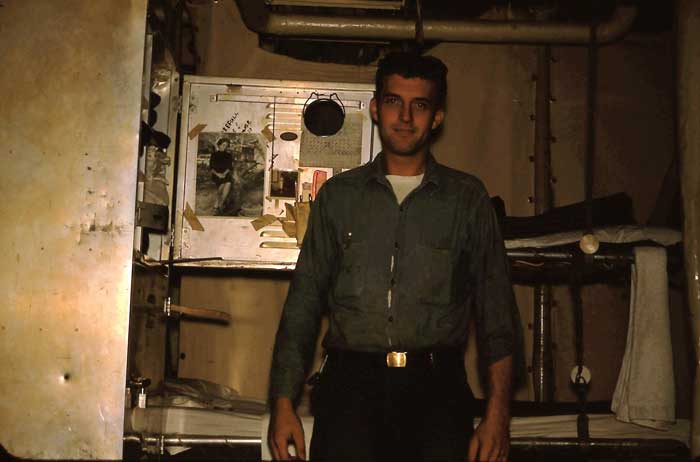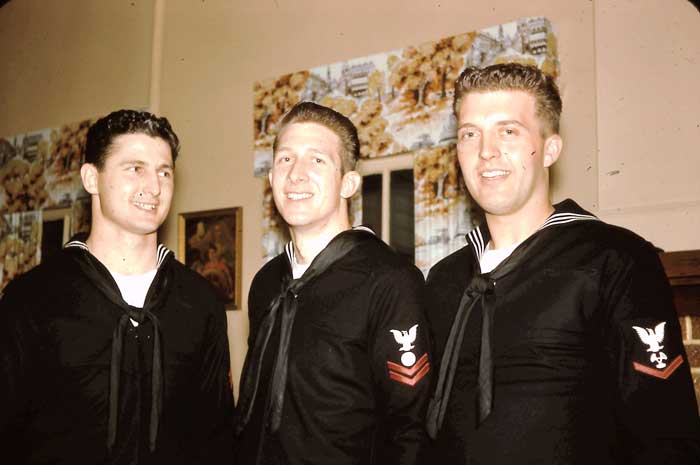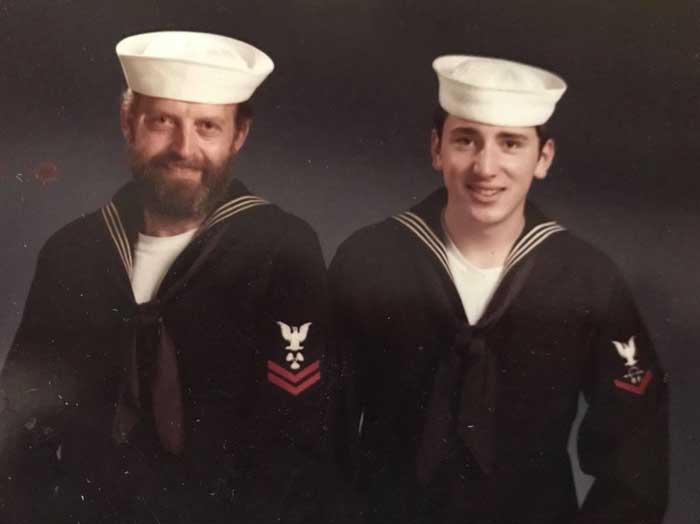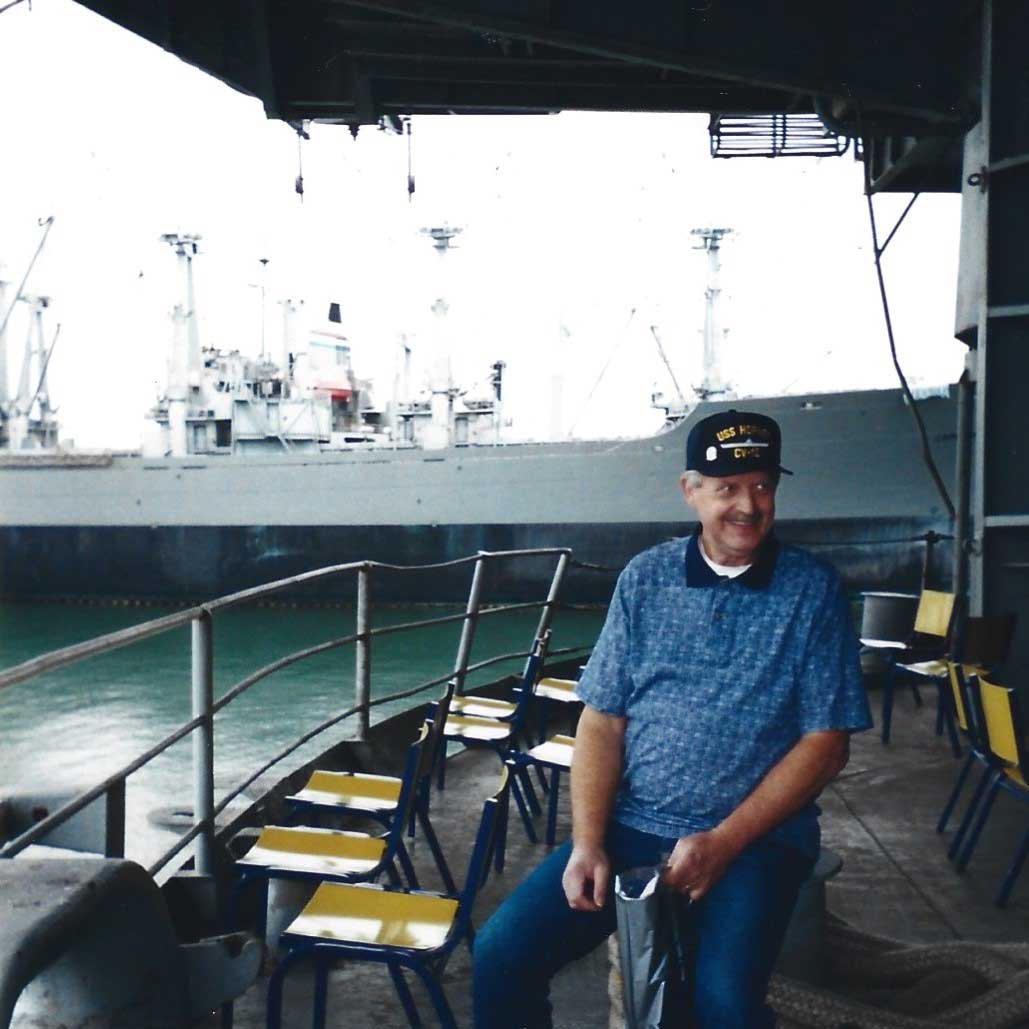Reuniting Dad With His Warship After 37 Years Was a Reminder That Life Is Fleeting The legendary warship Dad served on—used in three wars and as the recovery ship during America’s first and second lunar landings—was now rotting in place.
My dad’s Navy service was nothing special. His single enlistment spanned from the end of the Eisenhower administration through that of John F. Kennedy. But in that time the Navy changed his life.
In 1958, Merlin Chetlain left East Dubuque, Illinois, and Midwest farm life. In the Navy, he saw the ocean for the first time, then traveled across the Pacific during two deployments on the USS Hornet. He met and married my mom while stationed in Long Beach, California. After his ship entered the Puget Sound Naval Shipyard in Bremerton, Washington, for an overhaul, Dad took a discharge.
When I came along a few years later, all that remained of his service were random artifacts around the house—little white towels with service numbers stenciled on them, a peacoat that hung in the closet, Navy-issue swim trunks he rarely wore.
Once, I saw his military discharge papers in his sock drawer and asked what they were. He explained it to me, and I always felt our conversation gave him closure on that chapter of his life.
To me, it seemed fantastical that my ordinary dad was once a petty officer on an aircraft carrier—something I’d only seen in movies. When I asked questions about his service, he always gave simple yet cryptic answers.

The author’s father, Merlin Chetlain served in the U.S. Navy from 1958 to 1962. (Photo courtesy of David Chetlain)
“Did you like it?”
“Yes,” he responded, “until I got married.”
“Do you miss it?”
“Not really,” Dad answered.
“What was the food like?”
“Edible,” he said.
“What did you do on the ship?”
“Work in the engine room.”
“Doing what?” I probed.
“I made steam.”
“What was it like after you made E-5?” I asked, referring to his rank.
“I no longer had to wait in line. I slept more.”
To a six-year-old, the answers were confounding and mysterious. I wanted to learn more, but I knew I’d have more luck pulling his teeth out than getting real answers.
But sometimes, out of nowhere, he’d come up with an anecdote about his former seafaring life. Like how he played cards on the fantail—his favorite place on the ship—and watched the sun set over the ocean.
Occasionally, his old Navy buddies blew through town. I loved when they dropped in for a visit. Meeting them was a portal into his not-so-distant past. I sat around listening as they reminisced, talking about places I’d only dreamed of and shipmates I’d never met. It was like joining a secret society.

The author’s father, Merlin Chetlain served in the U.S. Navy from 1958 to 1962. (Photo courtesy of David Chetlain)
Then one day, when I was around eight years old, Dad fell ill. He could no longer work. He was in and out of the local Veterans Affairs hospital for years. I visited him there, where other veterans had their own sets of struggles.
Eventually, when I was around 13, he came home for good. But he wasn’t the same after that. He spent most days quietly reading the Bible and, when he felt up to it, doing chores around our small farm.
He was no longer the superhero I’d wanted him to be.
Around that time, our family took a drive from our home in Oregon to Bremerton, Washington, to meet up with some of Dad’s old Navy friends. As we rounded the corner into the city, the first thing we saw was the mothball fleet lined up at Puget Sound Naval Shipyard. We stopped and took a tour on the battleship USS Missouri. As I stood on those teak decks where a surrender ceremony officially ended World War II, a shiver went down my spine.
Award-Winning Journalism in Your Inbox
After viewing everything open to the public, my brother and I stood on the railing and started commenting on the other mothballed ships in varying states of decay, including a derelict aircraft carrier rusting in place directly across from us, which we called the USS Rust Bucket.
“What are you guys looking at?” Dad asked as he walked up.
“That crappy old carrier over there,” I answered.
Dad squinted to get a better look. After a pause, “I think that’s the Hornet.”
What? I thought. The mighty vessel Dad served on—a legendary warship used in three wars, countless battles, and as the recovery ship during America’s first and second lunar landings—was now rotting in place?
Dad pointed to the fading “12” that we’d missed. “The Hornet was number 12. That has to be it.”

Merlin Chetlain, left, with his son, David Chetlain in 1985. David Chetlain grew up intrigued by his father’s service in the Navy. (Photo courtesy of David Chetlain)
I stood in silence, ashamed of my comments. I felt as if I’d mocked my own father. I couldn’t take the words back. We left without saying another word.
A few years later, in 1986, the Missouri was recommissioned by then-President Ronald Reagan. The Hornet was placed in the first position at Puget Sound Naval Shipyard, where it got a fresh coat of gray paint along with a new “12.” It looked ready to return to sea.
I’d followed in Dad’s footsteps, joining the Navy in 1984. I wound up at Naval Submarine Base Bangor in Kitsap County, Washington. Every time I drove by the shipyard on Highway Three, the Hornet silently greeted me. I smiled, thinking of Dad.
Then in 1989, the Hornet was stricken from the Naval registry, destined for the scrapyard. I shared the news with Dad.
“It was a good career,” he muttered, sighing a little.
But as the Navy decided what to do with it, the Hornet hung on. And in 1991, it was designated a National Historic Landmark. Maybe it wasn’t going to disappear after all!
By 1998, the Hornet had been donated to the Aircraft Carrier Foundation and parked in the former Naval Air Station in Alameda, California. Later that year, it opened to the public as the USS Hornet Museum.
That gave me an idea. Dad’s 60th birthday was coming up. When I told him that I planned to fly him and Mom down to the Hornet for a tour, he was very excited.
I spent a few months chasing down Dad’s old Navy buddies to see if they would surprise Dad in Alameda, but found no takers. Then I got to work coordinating work schedules and plane tickets. Finally, it all came together. In July of 1999, I picked my parents up at the airport in Oakland and drove them to the pier in Alameda.

Merlin Chetlain, left, with his son, David Chetlain. David Chetlain grew up intrigued by his father’s service in the Navy. (Photo by Virginia Chetlain)
The day of our visit coincided with the 30th anniversary of the moon landing. A whole slate of people involved in the Apollo program were guests that day, and many of them spoke. Among them was Apollo 11 astronaut Buzz Aldrin, the second person to walk on the moon. There was also Ed Nixon, the brother of the late President Richard Nixon, and John Wolfram, a Navy Underwater Demolition Teams swimmer who’d helped retrieve the splashdown capsule.
It was all very exciting to hear these men speak and have the chance to meet them. But the real thrill that day was watching Dad step on board his old ship for the first time in 37 years and walk the decks with him.
My daughter was with us, and we let Dad be our tour guide. I bought him a USS Hornet ball cap, and he walked around with a big grin on his face like he owned the place.
Eventually, we ended up on the fantail. I stood there while he told stories to me and anyone else who would listen about how he’d whiled away his time in this very spot in the endless Pacific.
Our Journalism Depends on Your Support
I had never seen him so happy, and I never would again.
As we left that day, Dad said to me, “This has been the best day ever. I just wish my old shipmates could have been here with me.”
I never had the heart to tell him that they all turned down an invitation to join him.
Dad is gone now. So are all his shipmates I knew.
In a life derailed by illness, Dad was most proud of his service in the Navy.
We buried him with military honors at Willamette National Cemetery near Portland, Oregon. The day we spent on the Hornet is a warm memory, and also a reminder: Don’t put off what you want to do in life. When a shipmate—or his son—calls, answer the phone. Accept the invitation.
You may not get another chance.
This War Horse reflection was written by David Chetlain, edited by Kristin Davis, fact-checked by Jess Rohan, and copy-edited by Mitchell Hansen-Dewar. Abbie Bennett wrote the headlines.





Comments are closed.